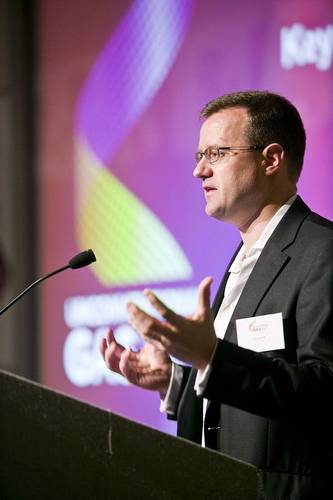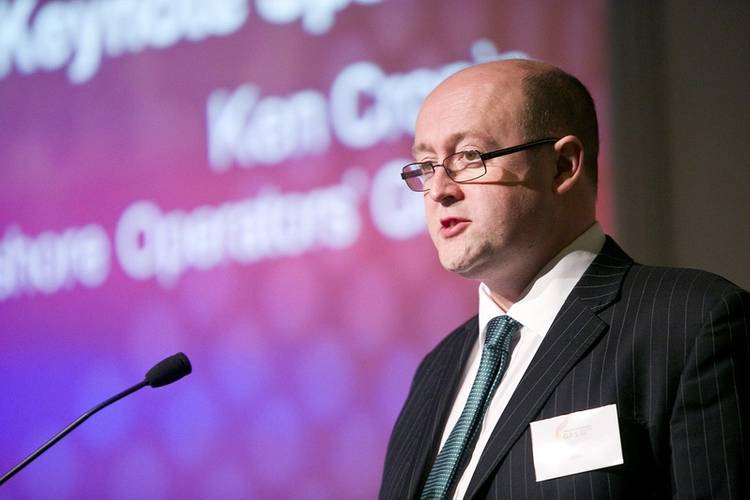Shale Gas a Stepping Stone to Energy Security
Speakers highlight need to support UK onshore gas production
Prominent figures from industry, government and academia converged in Aberdeen this week to discuss the main barriers to the development of unconventional gas, and the potential of this resource to provide indigenous energy supply.
Speakers at Unconventional Gas Aberdeen 2014 were looking at how sources such as shale could reduce costly gas imports, and around 250 delegates attended to hear about the possibilities and pitfalls which need to be addressed.
The two day conference and exhibition at Aberdeen Exhibition and Conference Centre on 25th and 26th March focused on themes such as supply chain, technology, planning, and the social license to operate. This was a key element of debate, with acknowledgement that more needs to be done reassure the public on the science behind unconventional gas and benefits to local communities.
Dan Byles MP, chairs the All Party Parliamentary Group on Unconventional Oil & Gas, a cross party group that brings together MPs and organizations from all sides of the debate to discuss the evidence in an open forum. He gave the keynote address and said, "We need a diverse energy mix and there is no simple solution for energy policy, however there is broad cross party support for developing shale gas. More than 80% of UK homes are heated by gas and we've moved from being a net exporter of gas in 2004 to now importing more than we produce. It's estimated that by 2030, 80% of our gas will be from imports at the cost of up to £15 billion per year.
"The 14th licensing round will be an interesting barometer to judge the levels of interest in the UK shale gas sector, but I believe there is a momentum behind developing UK shale gas to improve our energy security and create jobs and investment. We need transparency with local communities and robust regulation. It is more important to get this right than to do it quickly, but over the next 12 – 18 months we should see a number of new exploration wells start their journey through the planning and permitting process."
Ken Cronin, CEO of the UK Onshore Operators Group (UKOOG) was also a keynote speaker. He said, "Government regulators need to do more to explain to communities how tightly regulated shale gas production is to build reassurance. We also have to do more to explain the benefits and choices available to the UK supply chain. We cannot get to a position where we are importing the majority of our gas from countries with a worse human rights and environmental record, which are effectively holding the UK to ransom."
Malcolm Webb, CEO of Oil & Gas UK, spoke of the lessons that can be learned from the offshore industry. He said, "Onshore and offshore oil and gas are not separate industries; they are different manifestations of the same industry. We are likely to remain a petroleum-based economy for some time to come so we should maximize the recovery of our indigenous resources. There are several challenges to be faced on this including the lack of public and political knowledge of our industry and the ever-increasing expectations of the public, especially in safety upon which the industry needs to be proactive at all times. I also wish we could stop talking about unconventional gas - it is just natural gas."
This industry-driven event is in its third year. Mark Lappin, chair of the Unconventional Gas Aberdeen Conference committee, said, "We have built on the success of the conference and are focusing upon the emerging challenges. It was very interesting to hear pragmatic solutions to these issues from various perspectives in industry here and abroad."
A number of UK operators also shared their experiences during the two day event, including IGas and Dart Energy.
Major service companies including Halliburton and Schlumberger showcased new technologies supporting shale extraction. An academic showcase was launched by Horizon presenter Professor Iain Stewart where UK university students and other representatives of academic bodies displayed their insights on the subject including technical and non-technical submissions.
The meeting was supported by sponsors ASCO, Halliburton, Schlumberger, Corpro, Chevron, Bond Dickinson and Weir Group.
unconventionalgasaberdeen.com











